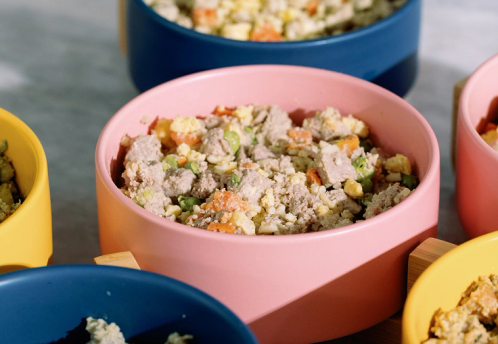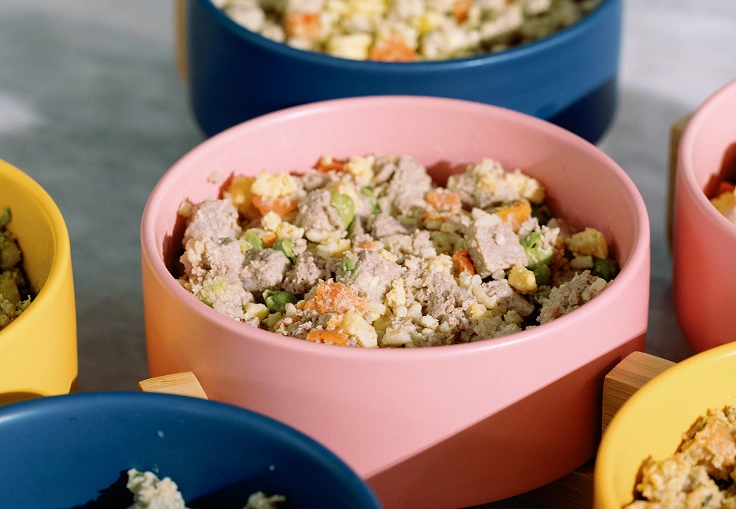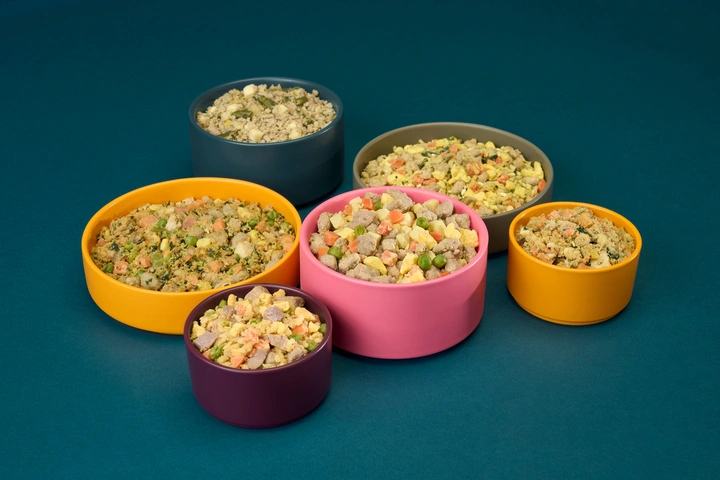Small but substantial, Frenchies love to lavish their pet parents with love and attention. But your French Bulldog’s sweet demeanor can quickly sour if they are struggling with skin allergies.
French Bulldog Coat Characteristics
The Frenchie’s coat is smooth, short and fine with loose skin that wrinkles up (adorably). Especially around the head and shoulders.
Reasonably easy to groom, the French Bulldog’s coat is manageable with proper care — generally a light brushing once a week. Frenchies are average shedders, but a gentle brush can easily remove any loose or dead hairs. The French Bulldog’s body type makes it easy for a pet parent to check for signs of skin allergies, including lesions, hot spots and flaky skin.
Skin Allergies in French Bulldogs
Allergies are a common problem for French Bulldogs, with one of the highest genetic and environmental predispositions to developing canine atopic dermatitis (CAD). Contact and environmental factors, as well as genetic and food-based allergies, can make their lives less comfortable than they deserve.
Food-related intolerances or allergies, on the other hand, take more time and testing to diagnose. Your dog’s diet will need to be evaluated and adjusted accordingly if a food allergy is the cause of your Frenchie’s skin problems.
Common Skin Allergy Locations
Frenchies are susceptible to developing hives, especially in connection with food-based allergies. Dry, flaky skin may occur in patches on the body, while hot spots, lesions, scabby and crusty sores may be found on the legs, paws, face, sides, and hind end.
If your Frenchie is scratching, chewing, or biting at these areas excessively, they likely have an allergy.
The Connection Between Skin and Food Allergies
The French Bulldog is prone to food allergies, and the inflammatory reactions often manifest themselves on the skin, including dermatitis, crusting lesions, hives, and pruritus.
Typically, the main source of food allergies is an intolerance toward one or more animal proteins. Often, meat and chicken are the primary culprits, although some dogs will have reactions to other allergens such as corn, milk, and eggs.
Treatment Options
Skin allergies can often be managed with proper hygiene. Bathe your French Bulldog with organic, sulfate-free, hypoallergenic shampoo to help control and reduce chronic itchiness. Look for shampoos that have additional anti-inflammatories such as hydrocortisone and aloe vera as these ingredients also calm red, inflamed, itchy skin.
Food allergies are a bit trickier. Your Frenchie’s veterinarian can help you develop a diet that will best serve your dog, such as an elimination diet trial. This process will allow the veterinarian to identify which protein sources are causing your dog discomfort.
Fresh food diets with real ingredients are an ideal way to identify and solve your Frenchie’s food allergies. You can start an elimination trial diet with your dog by following these steps:
- Start by feeding your French Bulldog a new, single-ingredient food over the course of eight weeks. Make sure this new food is the only one your dog eats during this trial to get the best results.
- The new food needs to contain only single sources of animal protein, vegetable protein, and carbohydrate calories. Some examples of this kind of food are rabbit and peas and fish and potato. The diet can be cooked or commercially produced, but the food should not have natural flavors or unidentified proteins as those ingredients can skew the elimination trial results.
- During the eight week trial, do not give your French Bulldog treats, table food, supplements, or flavored medications. These ingredients could influence the elimination diet results.
- After eight weeks, carefully and slowly switch your Frenchie back to his regular food. Observe him over the next few weeks to see if his allergies reappear.
Probiotics for dogs are an additional, inexpensive tool in the fight against allergies. Probiotics can help reduce inflammation related to allergic reactions while also supporting and strengthening a dog’s immune and digestive systems.
Keys to Managing Skin Allergies
Switching your French Bulldog to a fresh food diet is a great way to reduce or eliminate his allergies. Although commercial dry kibble and wet foods are attractive because of their lower prices and shelf life, they’re not commonly full of the quality nutrition your dog needs at any life stage.
The heating process that occurs when kibble is cooked often ruins any wholesome ingredients within the food. Alternately, fresh food has nothing but real ingredients, including ones vital to your dog’s health — healthy fats and essential fatty acids like Omega-3 and Omega-6.
Here’s a handy chart to help you refine your Frenchie’s journey into to fresh food:
| Condition | Dietary Needs and Adjustments |
|---|---|
| Coat Color Changes | Increase amino acids which can be found in protein (>75 grams per 1000 calories). Use our calculator to convert a label percentage to the caloric basis (grams per 1000 calories). |
| Concurrent GI Signs | Avoid foods with tryptamine and histamine, such as dairy or fermented vegetables and meats (yes, this includes bacon). Try a simple ingredient food trial |
| Chronic Itching and Dermatitis | Fortify the diet with Vitamin E, B Vitamins, Zinc, omega-6 and the omega-3 fatty acids found in fish oil. Add a probiotic and try a simple ingredient food trial |
| Dull Coat and Scaling | Adjust the EPA and DHA levels in the diet (added fish oil being the most common way); try a food that has added zinc |
| Dandruff and Crustiness | Introduce more Zinc and Vitamin A into their diet |




